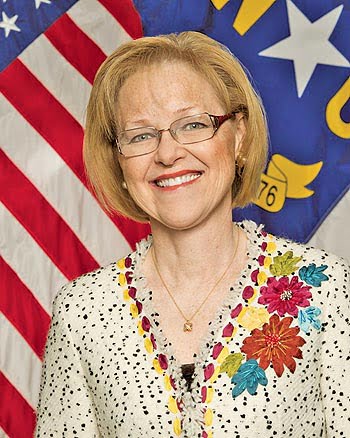NC Moves Forward on Medicaid Reform

Dr. Aldona Wos, Secretary of the North Carolina Department of Health and Human Services, was met with heavy skepticism when she arrived April 22nd at the MAHEC campus to address approximately 200 healthcare providers. Some came from as far away as Albemarle County to hear about the Governor’s plans to revamp the state’s Medicaid health services and services to the poor.
Secretary Wos appeared resolute about overhauling the state’s government health insurance, which serves more than 1.5 million people for about $13 billion a year.
She asserted that the current Medicaid system “is not sustainable, and the plan put forth by Gov. Pat McCrory calls for several ‘comprehensive care entities’ to create provider networks that would serve Medicaid recipients statewide.” These comprehensive care entities (CCE’s) would include private companies, both nonprofit and for-profit. Under the McCrory plan, a request for proposals is to go out early next year, laying out the requirements for private companies.
Wos, a retired physician who practiced medicine in New York in the 1980s and ’90s, says she learned from her experience when a managed care boom led to unpaid bills and other problems. She considers it her task, as a result of that experience, to convince doctors and other health providers that she knows the potential pitfalls of reform and how to circumvent them. Those enrolled in Medicaid would choose their comprehensive care entity, and the CCE would be responsible “for the entire continuum of care for a patient, Wos said.
Uneven track record
A number of states have made this move with mixed results on savings, according to a 2012 report from The Kaiser Family Foundation.
Wos’s critics point to Kentucky, where millions of dollars in medical bills sit unpaid. Kentucky Spirit, one of the managed care groups, is suing, saying the Kentucky government provided faulty information and made costs seem lower than reality.
A first-year review of Kentucky’s system, published last November by the Urban Institute and the University of Kentucky, detailed a number of problems, including “increased administrative difficulties” for doctors.
At present, the nonprofit Community Care of North Carolina coordinates care for the bulk of the state’s Medicaid recipients; Community Care of Western NC coordinates Medicaid care in parts of WNC. Some worry about the future of the nonprofit, which is seen by many as a model for Medicaid.
“North Carolina is known across the country for the innovations we’ve done with (Community Care of North Carolina). We’ve been given national awards,” said Shannon Dowler, president of the N.C. Academy of Family Physicians. “So the idea of undoing all that hard work we have done in the state over decades and handing it over to a for-profit, out-of-state organization just feels very shortsighted.”
Governor McCrory and his team want to phase in the new system in July 2015. The General Assembly must approve the changes; the governor said he hopes that happens during this legislation session.
The federal government would have to sign off on the plan before it’s finalized, because it pays for more than 65 percent of Medicaid in the state.








